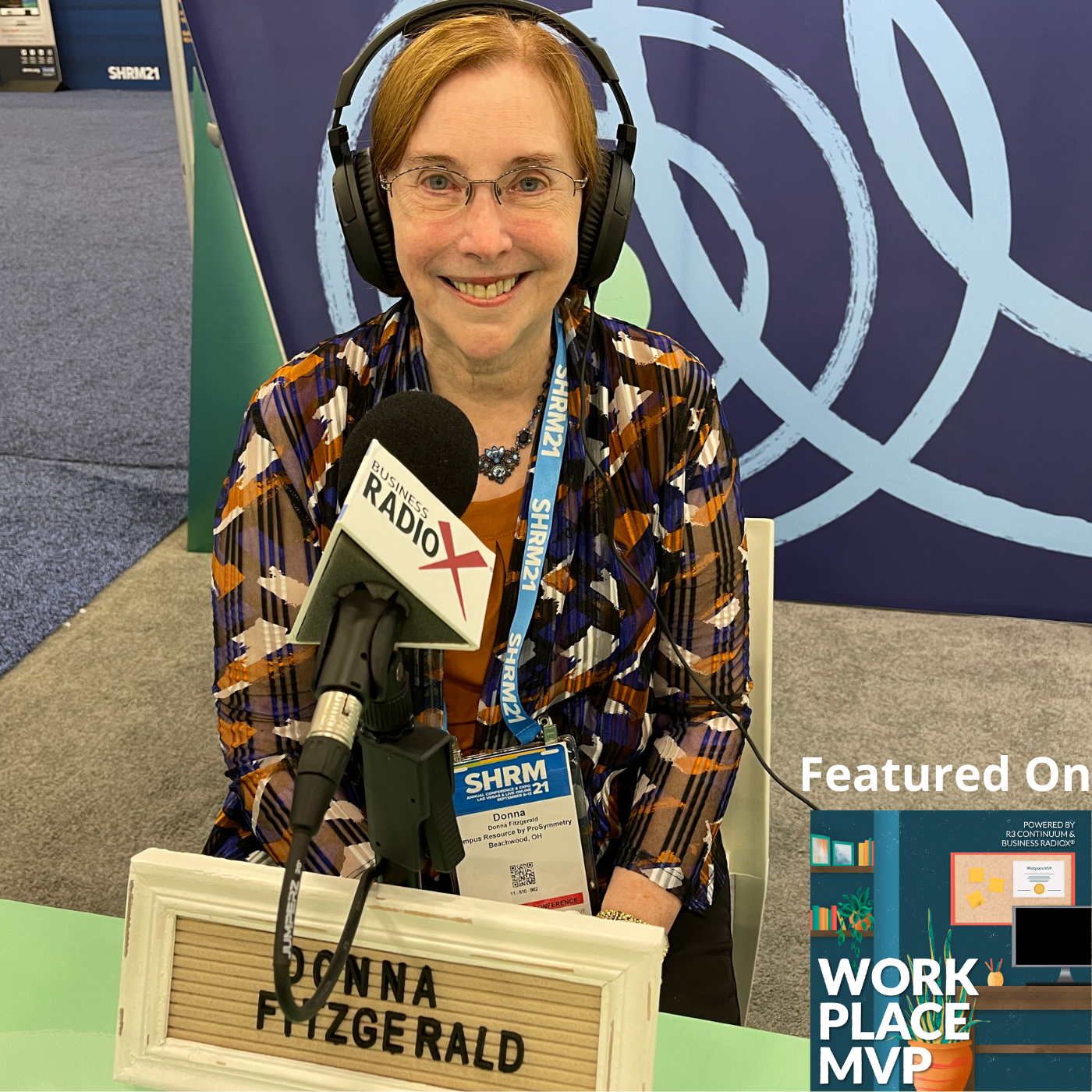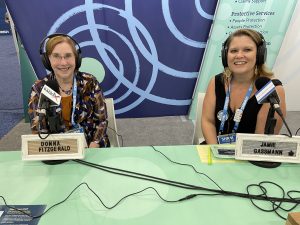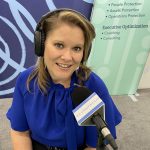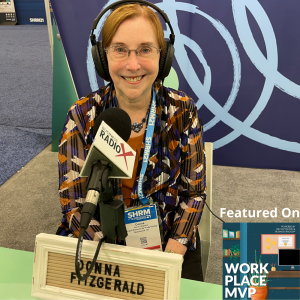
Workplace MVP LIVE from SHRM 2021: Donna Fitzgerald, ProSymmetry
Donna Fitzgerald, Chief People Advocate at ProSymmetry, joined Jamie Gassman at the Workplace MVP Booth at SHRM 2021 to discuss resource management and how to adapt to current conditions to get strategy executed. Donna presented at the Strategies and Innovation Theater during the conference. Workplace MVP is underwritten and presented by R3 Continuum and produced by the Minneapolis-St.Paul Studio of Business RadioX®.
This show was originally broadcast live from the 2021 SHRM Annual Conference held at the Las Vegas Convention Center in Las Vegas, Nevada.

Donna Fitzgerald, Chief People Advocate, ProSymmetry

After advising PPM clients for ten years at Gartner, Donna’s only goal was to find a company whose mission matched her own. Her future employer of choice had to develop software that solved real-world problems and improved employees’ working life. When Prosymmetry hired her to write a white paper, she knew she’d found the right company. An additional advantage of working for Sean is that Donna now has the work-life balance to enjoy buying beads and making jewelry in her spare time.
Tempus Resource by ProSymmetry
Tempus Resource has reshaped resource management for the world’s leading companies. Tempus Resource is a purpose-built resource forecasting and capacity planning solution. It is a standalone platform for all resource management and strategic decision-making activities.
About Workplace MVP
Every day, around the world, organizations of all sizes face disruptive events and situations. Within those workplaces are everyday heroes in human resources, risk management, security, business continuity, and the C-suite. They don’t call themselves heroes though. On the contrary, they simply show up every day, laboring for the well-being of employees in their care, readying the workplace for and planning responses to disruption. This show, Workplace MVP, confers on these heroes the designation they deserve, Workplace MVP (Most Valuable Professionals), and gives them the forum to tell their story. As you hear their experiences, you will learn first-hand, real-life approaches to readying the workplace, responses to crisis situations, and overcoming challenges of disruption. Visit our show archive here.
Workplace MVP Host Jamie Gassmann

In addition to serving as the host to the Workplace MVP podcast, Jamie Gassmann is the Director of Marketing at R3 Continuum (R3c). Collectively, she has more than fourteen years of marketing experience. Across her tenure, she has experience working in and with various industries including banking, real estate, retail, crisis management, insurance, business continuity, and more. She holds a Bachelor of Science Degree in Mass Communications with special interest in Advertising and Public Relations and a Master of Business Administration from Paseka School of Business, Minnesota State University.
R3 Continuum
R3 Continuum is a global leader in workplace behavioral health and security solutions. R3c helps ensure the psychological and physical safety of organizations and their people in today’s ever-changing and often unpredictable world. Through their continuum of tailored solutions, including evaluations, crisis response, executive optimization, protective services, and more, they help organizations maintain and cultivate a workplace of wellbeing so that their people can thrive. Learn more about R3c at www.r3c.com.
Company website | LinkedIn | Facebook | Twitter
TRANSCRIPT
Intro: [00:00:04] Broadcasting live from the SHRM 2021 Conference at the Las Vegas Convention Center, it’s time for Workplace MVP. Brought to you by R3 Continuum, a global leader in workplace behavioral health, crisis, and security solutions. Now, here’s your host.
Jamie Gassmann: [00:00:22] Hello, everyone. Jamie Gassmann here, your host of Workplace MVP, and we are broadcasting from the SHRM 2021 Conference here in Las Vegas, Nevada. And with me today is Donna Fitzgerald. She’s Chief People Advocate from ProSymmetry. Now, Donna, I understand you also have another title. Can you share that title with us and talk to us a little bit about how you came into this role?
Donna Fitzgerald: [00:00:49] I’d be delighted to. So, my other title is Chief Product Evangelist. But what I found with the H.R. space is that it just implied I was only interested in pushing a product, and that is – anyone who knows me that’s so not me. Because the reason, after I retired from Gartner, the reason I came back to work was because I really felt that no one was taking a look at the fact that people weren’t liking their jobs. The engagement rate was – disengagement rate was going up, and we’ve got great work and great jobs, but we’ve got to clean up some of the mess so that we can get the right people in the right place at the right time. And, the best way to do that was software. And, software in this case really has changed the world, and people need to stop looking at it as we’re shilling something, but more saying now with SaaS, you could buy something for very inexpensive comparatively, and it’s going to let you do things you’ve never even dreamed to do it.
Jamie Gassmann: [00:01:55] Interesting. So, you came out of retirement.
Donna Fitzgerald: [00:01:58] Out of retirement.
Jamie Gassmann: [00:01:59] And joined ProSymmetry. And so, now, are you, and I understand you’re working with a product, Tempus Resource. So, are you kind of part of the development of that? What’s your role with that?
Donna Fitzgerald: [00:02:11] Well, so, I worked for Gartner for 10 years. I was a research vice president, and one of the things that the team at ProSymmetry wanted was not only my years and years of knowledge in what we could do to help people better get to the right work, how we could make strategy get executed. So, I’m not really working as a product manager, which I’ve done before, but more as a chief advisor and somebody talking to our clients because clients have business questions. And, I spent 10 years on the phone answering those questions at Gartner.
Jamie Gassmann: [00:02:51] Right. Well, there’s so much power in talking with your client directly, right, and hearing what their challenges are and what they’re experiencing. So, now, I understand – so we’re here in the expo and I know you presented at the Strategies and Innovation Theater.
Donna Fitzgerald: [00:03:04] Yes.
Jamie Gassmann: [00:03:04] So, talk to me about what was your presentation on.
Donna Fitzgerald: [00:03:07] So, one of the things, and I think it’s really important for everybody to understand, is if we want to get strategy executed, which is what we have to do in the post-COVID world, we can’t just keep pretending it’s business as usual. We’ve got to keep looking at what’s the right thing to do right now knowing that an event might happen and we’re going to have to change our minds. So, we’ve got to be agile. We’ve got to be flexible. We’ve got the knowledge to do this today, what we need, and this was the important message. We need finance, we need H.R., we need the PMO, and we need resource managers to all get-together and work together to solve the strategy to execution pipeline and not burn people out.
Jamie Gassmann: [00:04:02] Yeah.
Donna Fitzgerald: [00:04:04] H.R. brings something to this. That the typical, you know, let’s just look at projects [inaudible] because it starts reinforcing career growth. It starts making sure that people get reskilled and upskilled, but not in an onerous sense, in a sense where they can say, “God, I really want to do that for a living,” or “I really want to learn that.” And, that’s what gets me excited.
Jamie Gassmann: [00:04:27] Like helping them find their passion almost.
Donna Fitzgerald: [00:04:28] Absolutely.
Jamie Gassmann: [00:04:29] Yeah. Because you get a different caliber out of your employee when you’re putting them in something that they really enjoy.
Donna Fitzgerald: [00:04:37] I’ve been privileged to actually manage quite a few programs and projects in my life, and I’ve had such incredible creative teams. And, now, when I talk to people that they’re burnt out and they’re quitting, and now if you burn out a software developer, they leave the profession. And, we can’t afford that.
Donna Fitzgerald: [00:05:01] So, I’m going, “Why do we want burnout, unhappy people when I worked with people who loved what they did and knocked it out of the park?” And the same caliber of people. So, what’s the difference?
Jamie Gassmann: [00:05:15] Yeah. Interesting. From your perspective, in the conversations you’ve had with clients, in the research you’ve done on this topic, what do you think are some of the reasonings for the burnout? Is it workload? Is it just the balancing of home and life? What’s driving that?
Donna Fitzgerald: [00:05:33] It is the workload, but not for the reason people think.
Jamie Gassmann: [00:05:39] Interesting.
Donna Fitzgerald: [00:05:40] So, I talk to lots of people who say, “Well, you’re on this for 25%, you’re on this for 25%, you’re on that for 15%. And then, you know, I will kind of find something else for you to do because, oh my god, you’re underutilized.” And, the answer is no, you’re being driven to distraction. Because if you have to do brain work and software development and engineering, which is really the areas I focused in, that’s brain work. You kind of can do two things, maybe, in a day if you can break for lunch.
Donna Fitzgerald: [00:06:21] I talked to clients who tell me, “Oh, well, we have an estimate of a thousand hours,” and I go, “Is that a thousand hours of work by one person over a certain period of time?” “No. Maybe, we’ll assign four people.” “Well, do you realize if you assign four people, that’s 1700 hours worth of work mathematically?” And, they go, “Ha? Ha?”
Donna Fitzgerald: [00:06:47] And, yet we could prove it. We have the hard data. We understand the way the brain works. And, yet people keep doing it, and that’s why we get burnout.
Donna Fitzgerald: [00:06:58] So, when I was younger, people worked on a product, they worked on a project, and this is what Agile’s trying to do. But Agile has a hidden problem. That they’re just letting people randomly pull things down off the backlog that may have nothing to do with the same product. They may be helped tickets, they may be this. And, again, you’re not actually working to complete a body of work, and it’s the completion that makes people fulfilled.
Jamie Gassmann: [00:07:35] Oh, absolutely. Like, they’ve conquered something. You know, seeing that product come to conclusion makes a huge difference. You know, if it sits idle or it continues to just, you know, extend out, people tend to feel almost defeated and overwhelmed.
Donna Fitzgerald: [00:07:50] I wouldn’t be able to recite it full, but there’s something from the Tao Te Ching that talks about governance. And, it says that if the emperor does it right and quietly, at the end people will stand up and say we made this.
Jamie Gassmann: [00:08:11] Wow.
Donna Fitzgerald: [00:08:12] And, that to me says why would we take that away from people, especially when it’s cheaper, faster, better?
Jamie Gassmann: [00:08:23] Yeah. Interesting. So, with your product and that strategy, you know, from the kind of almost like that full kind of pipeline or the chain that you were mentioning, you know, talk me through what – how does that help an individual, like a business that’s trying to manage this or get to a better place? What are some of the things they can help them to solve?
Donna Fitzgerald: [00:08:43] Well, fundamentally, the first thing you look at is resource capacity planning. So, I take companies. You tell me what your strategy is. Now, most companies according to H.B.R. have between three and five strategies. So, let’s figure out how much of people’s time, because people are the scarcer resource than money in today’s economy so that’s critically important to understand. So, how much in terms of people hour do you want to put into each of those strategies?
Donna Fitzgerald: [00:09:17] So, when you have the people hours, you can say, “All right. How much work can we do with assigning people to get things done?” We don’t need 15 projects starting in January, all running scattered with people all over. And then, something will go wrong. It’s the first rule of project management. One of those ideas is going to be a disastrously wrong thing, which we all do.
Donna Fitzgerald: [00:09:48] Well, then the house of cards doesn’t work. But if we say we’re going to do this and then we’re going to do this and then we’re going to stop. The reason I fit in the Agile Movement since the beginning, basically the ’90s, and the reason we who advocated Agile were advocating it was because every time you ship software, you change the nature of reality. Fundamentally, software is evolutionary.
Donna Fitzgerald: [00:10:20] So, that says, if you tell me I want something that does a, b, c, and then I want d, e, f, and I tell you, no, I’ll give you a, b, c, then you lived with it for a month or so, and then I’ll give you d, e, f. They’ll never ask you for d, e, f. They will never – they might ask for f. But they’ll ask you for two other things because once they lived with it and see it, they realize, “Oh, well, now that I can do that, this is what’s really important and I didn’t see that.” And, I can see this because I’ve been basically around software for the last 42 years.
Jamie Gassmann: [00:11:00] Wow. Wow.
Jamie Gassmann: [00:11:02] And, this rule has never been violated in my work and career.
Jamie Gassmann: [00:11:06] Interesting. So, you’ve kind of watched it, like, evolve into – now, I mean, obviously, software is, you know, large industry and lots of different types of software, and you’ve got A.I. and all these other technologies coming into play. So, this really could help from that project management perspective in ensuring you’re assigning resources appropriately.
Donna Fitzgerald: [00:11:26] It really does. And, it makes everything a community approach. So, it’s not just, I’m going to dump something on a user group so to speak. It’s we’re all co-creating. Because having started 42 years ago, we were rolling the dice on everything and I knew the people who wrote the general ledger system at the company I worked with and they’re telling me about swapping things in and out of 16K of memory. Now, most of our listeners will have no idea what I’m talking about. No idea at all.
Donna Fitzgerald: [00:12:09] But we were all in constant co-creation. Now, we’ve made a god out of process and it’s can we do it faster, faster, faster? And the answer is no, we probably shouldn’t do it faster, maybe we should just stop doing it.
Jamie Gassmann: [00:12:29] Interesting.
Donna Fitzgerald: [00:12:29] Maybe, it doesn’t make any sense. Maybe, it’s the wrong thing. So, I want to help people get some of the noise out of their system, and really say, “Is this working?”
Donna Fitzgerald: [00:12:46] A friend of mine in Australia talks about outcomes. Look at where you want to be when you think it’s going to work and then slowly, incrementally, walk one step, check is it still working? You may have to go 30 degrees to the left or right. That’s life. Why would we try to pretend it’s anything else? And people are wired to do that. That’s what human beings innately can do.
Jamie Gassmann: [00:13:17] Right. Almost like a pivoting act in a way.
Donna Fitzgerald: [00:13:19] It is.
Jamie Gassmann: [00:13:19] Yeah. It’s kind of, you know, over the last year pivoting has been like our nature.
Donna Fitzgerald: [00:13:25] Well, your point is so fantastic because, “Oh, we can’t support people from work working from home.” “Excuse me, what was the average 30-60 days?”
Jamie Gassmann: [00:13:36] Yeah, right?
Donna Fitzgerald: [00:13:37] How fast can we move? That’s who people really are.
Jamie Gassmann: [00:13:42] Yeah, amazing. Well, from your presentation, you know, it sounds like there was some great content in there. If there were like three takeaways, thinking of how you presented, three things that you wanted that audience to be left with that they take back and kind of either it affirms what they’re doing or it changes their perspective on something, what would those three things be?
Donna Fitzgerald: [00:14:06] Well, I guess one of the things would be that strategy execution isn’t just a process of people working really hard. It’s part of living so that if I’m on a project, I’m there because I’m good at it or I want to get good at it, and I’ll work on something else. We can continuously evolve. If we’re careful, we structure it. We’re constantly checking. Is this what we want?
Donna Fitzgerald: [00:14:44] So, I want people to know that it’s not just a financial work process. I want them to understand all of it has to do with everybody touching it and we should be co-creating it together. I know that’s kind of fuzzy words, especially for an ex-CFO. But I’ve seen it work.
Jamie Gassmann: [00:15:07] Yeah. Well, there’s power in co-creation.
Donna Fitzgerald: [00:15:10] There really is.
Jamie Gassmann: [00:15:10] That collaboration of allowing the different thought processes to come into play.
Donna Fitzgerald: [00:15:15] Well, and I use the word co-creation because I want to always be focusing on outcome. I do not have a, you know, touchy-feely bone in my body. I am really results-driven. We are going to get there or we will know the reason why, and that the reason why may truly exist. Failure is an option if we made a mistake.
Jamie Gassmann: [00:15:42] Right. Very interesting. Well, it sounds like your listeners at your presentation got some great content from you and definitely some food for thought as they leave this conference. Thank you so much for joining us, Donna.
Donna Fitzgerald: [00:15:55] Well, thank you. It’s a pleasure and a privilege.
Jamie Gassmann: [00:15:58] Absolutely. So, if our listeners wanted to get a hold of you and learn a little bit more about the concepts you shared or a little bit more even about Tempus Resource, how would they go about doing that?
Donna Fitzgerald: [00:16:09] Well, probably the easiest way is just to email me at dfitzgerald@prosymmetry.com. And, I always have time. You know, reach out to me on LinkedIn. I’m quite visible there. And, I’m very lucky that our CEO makes sure I have time to answer questions for people. I do spend a lot of time on the phone doing this, so no one should feel they’re imposing. I would be delighted to talk.
Jamie Gassmann: [00:16:39] It’s wonderful. Well, our listeners, I’m sure, will be happy to hear that, especially with the nuggets of great information you left them with today.
Donna Fitzgerald: [00:16:45] Well, thank you. It was a pleasure.
Jamie Gassmann: [00:16:47] Thank you so much.
Jamie Gassmann: [00:16:49] And, for those listening, join us at our booth 4076 and check out the podcast. And, while you’re there, learn a little bit about R3 Continuum, our show sponsor. We’d love to see you. Talk to you then.















